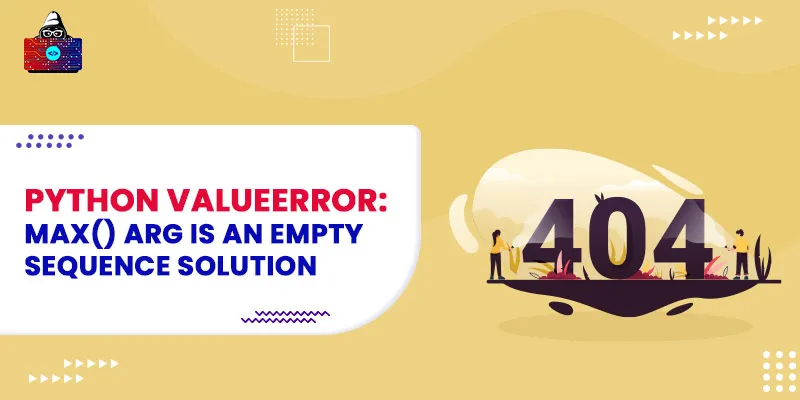Python
max()
is an inbuilt function that can accept an iterable object and return the largest value from it. Instead of an iterable object, we can also pass more than one argument value to the
max()
function, and it will return the largest value. But if we pass an empty iterable object like an empty list, empty string, empty tuple, or empty set in the max function, it will throw the Error
ValueError: max() arg is an empty sequence
.
In this Python tutorial, we will discuss this error statement in detail and learn how to solve it. We will also walk through an example that will demonstrate this error, and in the solution section, we will solve that error.
Python Error ValueError: max() arg is an empty sequence
In Python, we often use max() and min() functions to get the largest and smallest value from a list, tuple, and string. And instead of writing a simple comparison operation, we can use the max() or min() methods to find out the minimum and maximum values.
The max() function will only work if we pass a non-empty iterable object as an argument, and all the values of that iterable object must be of the same data type. If we pass an empty iterable object as an argument value to the max() method, we will encounter the
ValueError: max() arg is an empty sequence
Error.
Now Let's discuss the Error statement in detail. The Error statement can further be divided into two parts
- ValueError (Exception Type)
- max() arg is an empty sequence
1. ValueError
The ValueError is one of the Python standard exceptions. It is raised in a Python program when we specify the right argument data type to a function, but the value of that argument is wrong. We can pass iterable objects to the max() method, but if the iterable object is empty, it raises the ValueError Exception.
2. max() arg is an empty sequence
max() arg is an empty sequence
is the Error Message, it is raised along with the ValueError to tell the programmer more specific detail about the error. This error message tells us that the iterable sequential argument we passed to the max() method is an empty object.
Example
my_nums = [] #empty string
largest_num = max(my_num)
Output
Traceback (most recent call last):
File "<stdin>", line 3, in <module>
ValueError: max() arg is an empty sequence
Common Example Scenario
Now we know why this error raises in a Python program. Let's discuss an example of how we can solve this error. We have a
prices
list that is supposed to contain the prices of the different products. And we need to create
a program
that asks the user to enter all the prices of the product they brought from the store. And return the largest value price from the
prices
list.
Let's say if the user buys
0
products from the store, in that case, if we apply the max() method on our
prices
list we will get the error.
Error Example
# list of all prices
prices =[]
# number of products
products = 0
for number in range(products):
price = float(input(f"Enter the price of product {number +1}"))
# append the price in the prices list
prices.append(price)
# find the largest price
most_expensive = max(prices)
print("The most expensive product price is: ",most_expensive )
Output
Traceback (most recent call last):
File "C:\Users\tsmehra\Desktop\code\main.py", line 13, in
most_expensive = max(prices)
ValueError: max() arg is an empty sequence
Break the code
In this example, we are getting this error because the list
prices
passed to the
max()
function is empty. The value of products is 0. That's why we are not able to append values to the
prices
list, which makes a list empty, and the empty list causes the error with the max function.
Solution
If you encounter such situations where the list object depends on some other statements, it might be possible that the iterable object can be empty. In such cases, we can specify a default argument value to the max function that will be returned if the iterable object is empty.
max(iterable_object, default = value)
Example Solution
# list of all prices
prices =[]
# number of products
products = 0
for number in range(products):
price = float(input(f"Enter the price of product {number +1}: "))
# append the price in the prices list
prices.append(price)
# find the largest price
most_expensive = max(prices, default = 0.0)
print("The most expensive product price is: ",most_expensive )
Output
The most expensive product price is: 0.0
Wrapping Up!
The Error
ValueError: max() arg is an empty sequence
raises in a Python program when we pass an empty iterable object to the max method. To solve this error, we need to make sure that we are passing a non-empty iterable object to the max() method. If the program is all dynamic and the iterable object elements depend on the program run, there we can specify the default argument in the max() method after the iterable object, so in the case of an empty iterable object, the max() method return the default value, not the error.
If you are still getting this error in your Python program, you can share your code in the comment section. We will try to help you in debugging.
People are also reading:
- Python SyntaxError: non-default argument follows default argument Solution
- Install Python package using Jupyter Notebook
- Python FileNotFoundError: [Errno 2] No such file or directory Solution
- Online Python Compiler
- Python RecursionError: maximum recursion depth exceeded while calling a Python object
- How to run a python script?
- Python TypeError: can only join an iterable Solution
- What is Python used for?
- Python SyntaxError: cannot assign to operator Solution
- Encrypt and Decrypt Files in Python





Leave a Comment on this Post